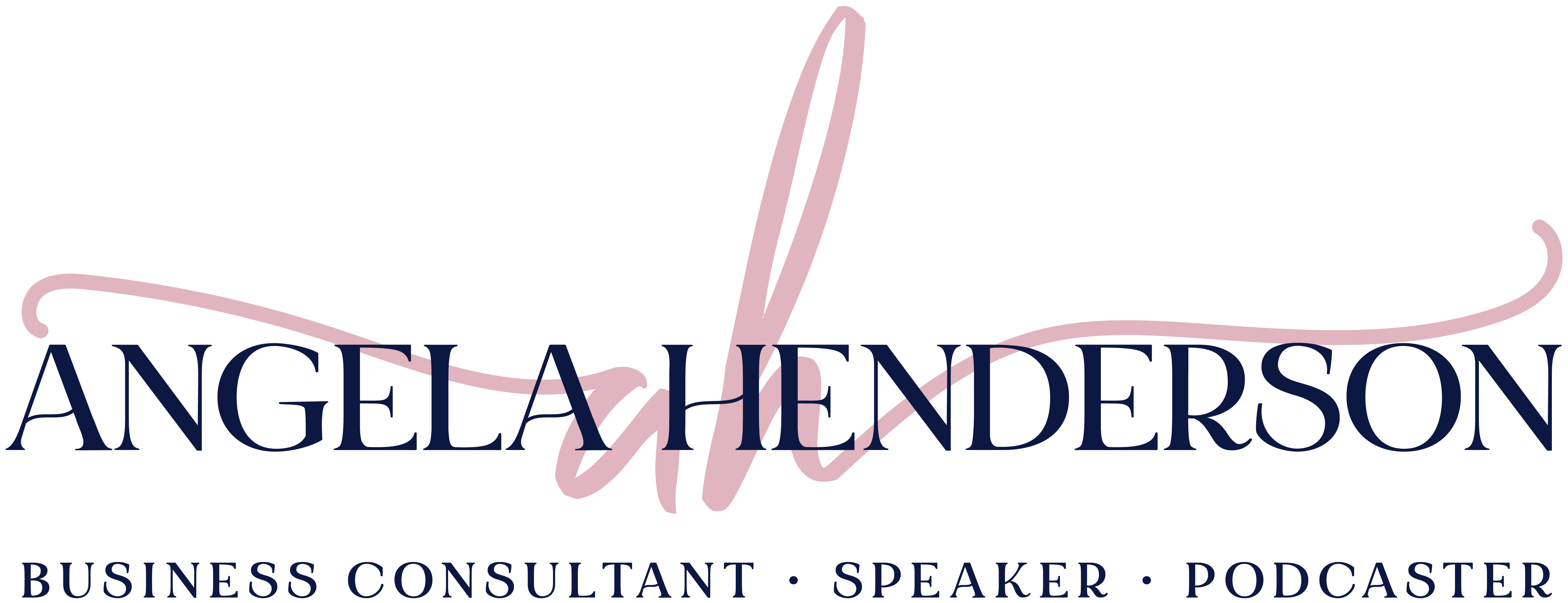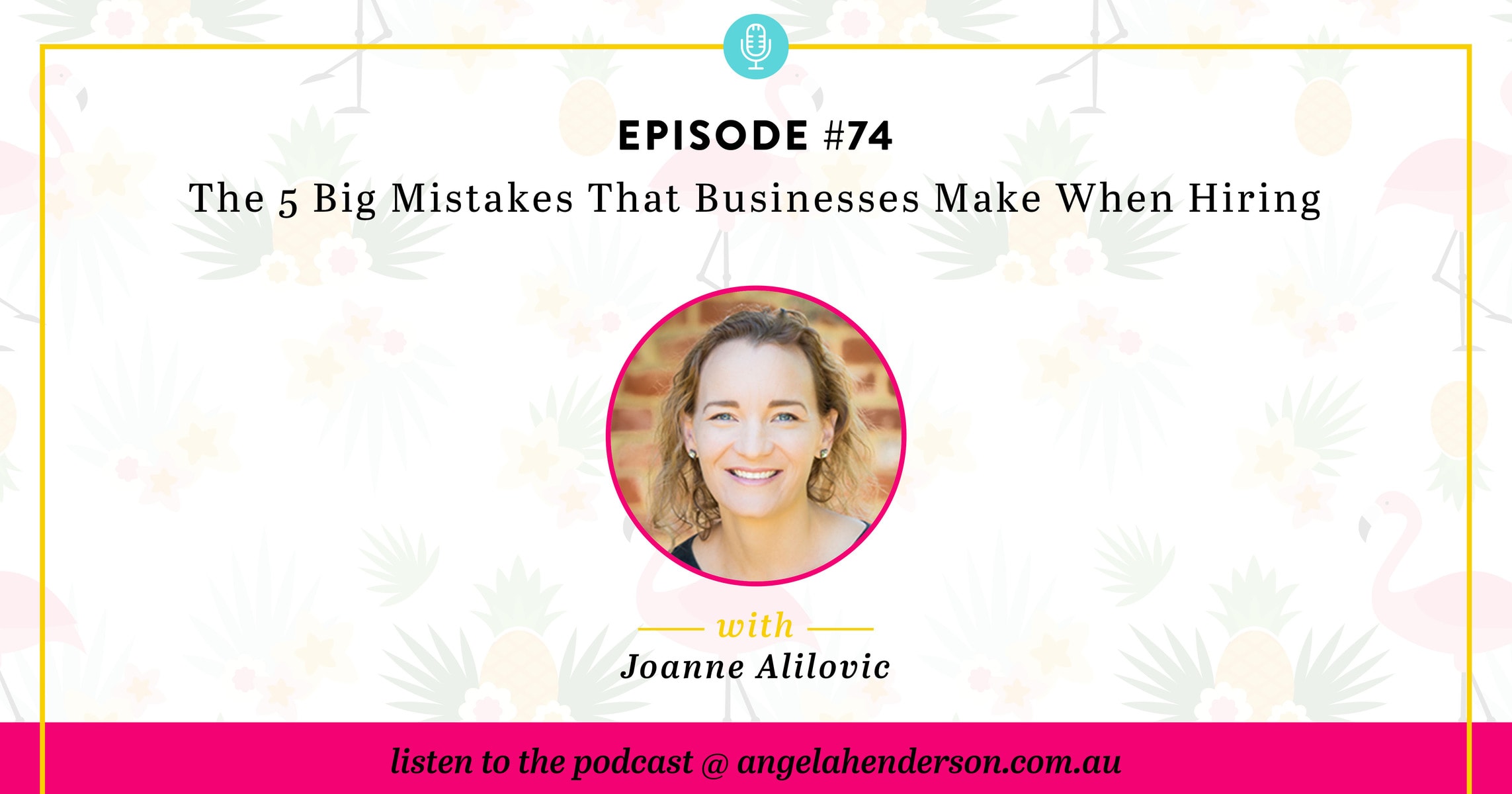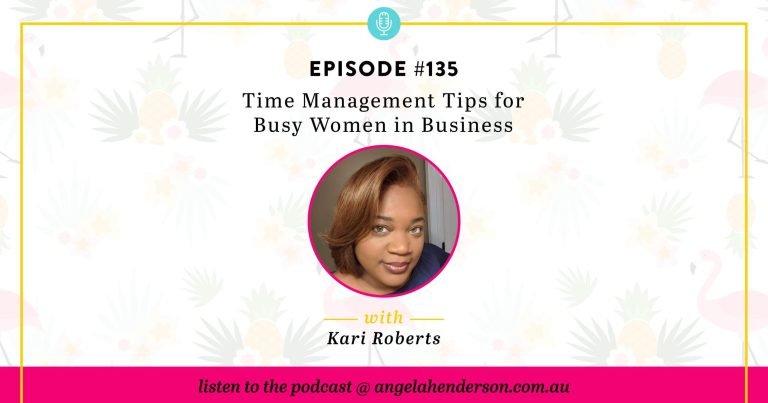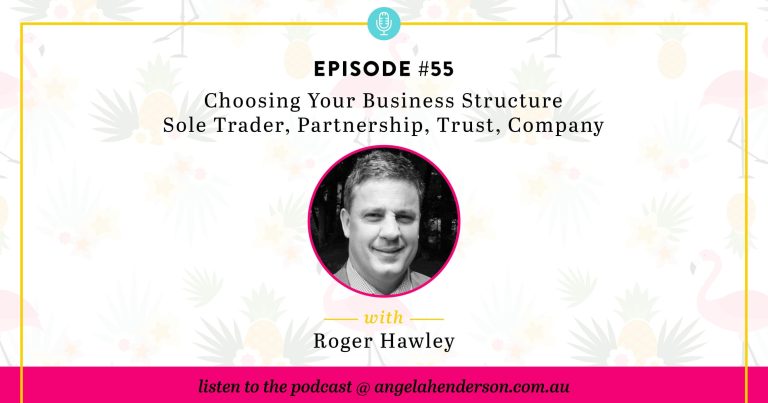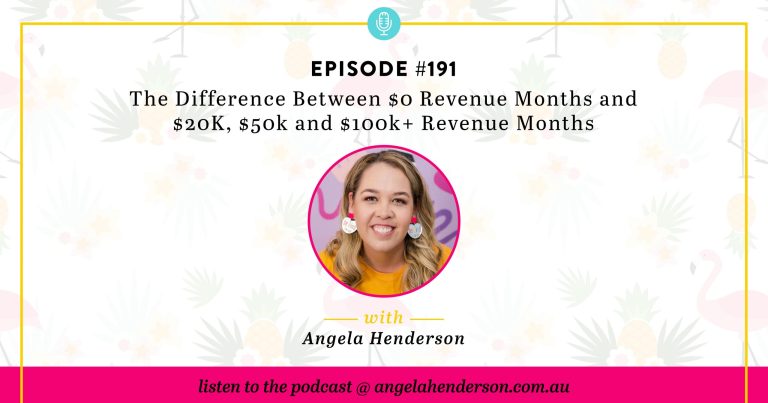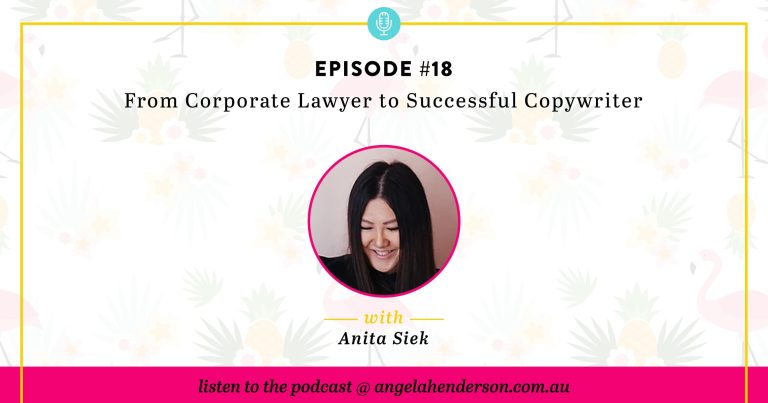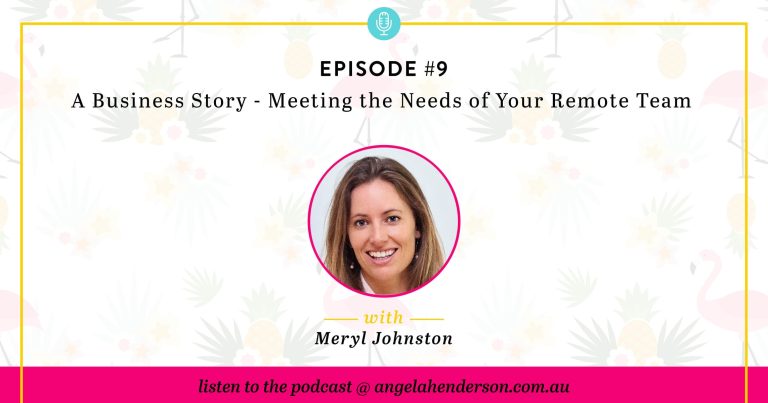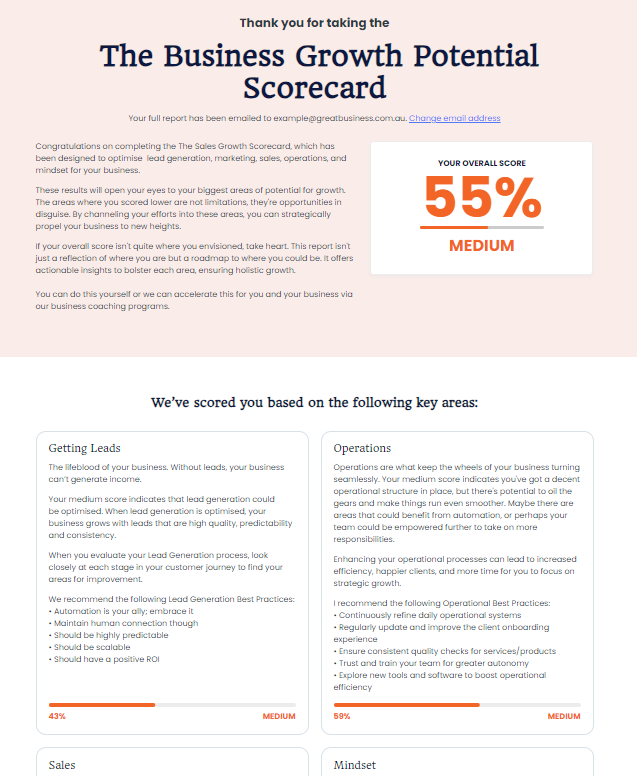Hiring is a hard, hard part of running your business. So many questions come up around it like how to hire, getting contractors or employees, what benefits do you need to give, and so much more. It’s not easy to make mistakes on hiring team members because, as business owners, this costs us money… valuable money that we need for our business.
So on today’s episode, I am super excited to bring on Joanne from 3D HR Legal to talk about all things hiring. We are going to talk about the 5 big mistakes businesses make when hiring, why they make these mistakes, how to avoid it, and the benefits of knowing how to hire. It’s going to be a jam-packed episode, so don’t miss out!
Important Links Mentioned in the Show:
Women in Business Retreat 2020
Australian Business Collaborative Facebook Group
Angela Henderson Active Business Facebook Group
Angela Henderson Facebook Business Page
Prefer to read The 5 Big Mistakes That Businesses Make When Hiring? Here’s the transcript:
ANGELA:
You’re listening to the Business and Life Conversations Podcast with Angela Henderson, Episode 74.
Hey there, you’re listening to the Business and Life Conversations Podcast. My name is Angela Henderson and on this show, we talk about improving your business, life or both, by having amazing and rich conversations with brilliant guests who will inspire you and who will give you tips and tricks to help you grow both in life and in business.
Well, hey there amazing peeps and welcome back to another awesome episode of the Business and Life Conversations Podcast. I am your host, Angela, from Angela Henderson Consulting where I am a Business Consultant helping women in business to develop the foundational framework and strategy they need to grow sustainable and profitable businesses.
Hiring. Hiring is a hot topic and something I get asked about every single week either from my one-to-one coaching clients, in my group coaching program, Profit Pillars with Angela Henderson, or even inside my Facebook community, The Australian Business Collaborative. I get asked questions like how to hire, should I go, contractor or employee, what benefits do I have to give them, should I hire in-country or should I hire overseas?
Now, I’m no lawyer so I point people here in Australia to fairwork.gov.au, and for those that live internationally, I always say it’s really important that you go to the particular country and/or state that you live in because their rules and guidelines could be very different. So it’s really important that again, I never give advice because it’s really important that, yes, I’m not a lawyer and you need to seek legal advice specifically because this is a super important matter.
And of course, as I get these questions, I equally hear about some horrific business mistakes that have happened by business owners simply because they didn’t know what they didn’t know. But if there is one thing I do know, that’s running your business is hard as fuck. And when it comes to hiring, it is double hard as fuck because as small business owners, we must, at times, when we’re looking at investing, we have little money to invest in order to grow our business.
And collectively, what this means is every single dollar we spend as small business owners on finding and hiring that staff member, a new employee, a new contractor can have a direct impact on both our business short and long-term. And when that has an impact, it’s either going to help us be successful or not be successful. So it is imperative to avoid making any major mistakes when hiring contractors or employees.
So if you can’t tell how passionate I am about this topic, I hope you’re picking up on that vibe and I’m super excited to bring on Joanne from 3D HR Legal, who is a lawyer with a wealth of knowledge who’s going to talk with us today about the five big mistakes that businesses make when hiring. She’s also going to be talking to us and chatting about why businesses are making these mistakes when hiring, what are the benefits of businesses taking time to understand how to best hire. And she’s also going to walk us through the five big mistakes that businesses make, which she’s also going to tell us ways to avoid these mistakes. So get ready; it is a jam-packed, super important episode for any business owner out there. So let’s get ready to rumble.
But before we jump into this particular episode, I just want to let you know that this episode is sponsored by my new on-demand business Master Class, The Ultimate 4-Step Framework for Creating a Sustainable and Profitable Business. In my 60-minute jam-packed Master Class, you’re going to learn my signature four-step framework for creating your sustainable and profitable business without sacrificing time with your kids, without the overwhelm or without wasting any more cash. I’m also going to dive deep into the four big business mistakes that pretty much everyone in business makes and why they’re keeping you from growing your sustainable and profitable business. And lastly, I touched briefly on what is working for businesses now and why most of what you’re being taught about growing your business is outdated and/or wrong.
To sign up for my on-demand Master Class, you can head to bit.ly/masterclasswithangelahenderson. Again, that link is bit.ly/masterclasswithangelahenderson and I’ll provide that link also in the show notes. Alright. Let’s get ready for today’s episode.
Welcome to the show, Jo.
JO:
Thanks, Anj. I’m so excited to be here.
ANGELA:
Excited to have you here. You’re over in WA. How is it over there, today?
JO:
We have a beautiful cloudy day, but I have a great outlook, looking at lots of trees so it always looks beautiful.
ANGELA:
Gosh. It sounds pretty amazing and pretty lush. Here in Queensland, it is a beautiful day. Again, we’re very lucky to live where we live; it’s very warm, beautiful, blue sky days. So yes, it is, and I’m super excited, at time of recording, it is a Friday, so we’ll be going into the weekend, which I’m super excited about. So, yes.
JO:
Always good to have some time out.
ANGELA:
Totally. Now, before we get into today’s episode, we were going to be talking about the five big mistakes that businesses make when hiring, I always like to ask kind of a fun question so that my audience gets a chance to know you a little bit better. So my question to you is, I know you love podcast, I think initially we met at We Are Podcast here in Brisbane a couple of years ago. So my question to you today is what is your all-time favourite podcast and why?
JO:
Oh, that’s so mean. I was so nervous about this question because obviously, I’ve listened to your podcast and heard some of the other questions you’ve asked other people. But I don’t know; I don’t know if any podcast listener can name a favourite. I listen to so many. I tend to listen to a lot of business-related ones, obviously, and that’s what led me to podcast in the first place. I think it changes. I would have to, perhaps, one of the first that I ever got started on, maybe that’s rushed start and it’s Happy Lawyer, Happy Life Podcast by my good friend, Clarissa Rayward.
ANGELA:
She’s in Brisbane, isn’t she?
JO:
Yes, she is in Brisbane. And it’s one of the things that got me inspired to know that as a lawyer, I could actually do podcasting. So I have to name that one.
ANGELA:
Alright. Fantastic. And she’s a remarkable lady. She’s done some wonderful things from, again, and I’m not a lawyer, but again, being around lawyers and that law space, really turning things upside down but in such a proactive and positive way. So no, fantastic choice, I would say.
Now, for those of you, obviously, we’re now talking about lawyers; people must be catching on that you might just be a lawyer, Jo. So can you take a moment and tell us a little bit about Jo, who you are, what you do and what your business is?
JO:
Sure. And yes, I should say, yes, I am a lawyer and I hope you’re not listening just because of that.
ANGELA:
Exactly. No, they want to stick around because this is a super important topic about hiring and how this impacts your business. So you actually want to embrace the lawyer here today.
JO:
Yes. So I didn’t always know that I was going to be a lawyer. I had a few people who suggested it, but I really wanted to be in business. Ended up doing a law commerce degree and found myself in the beautiful land of employment law, which I love because it’s all about the human side of work. And as far as I’m concerned, it’s often the second most important relationship that someone has in their life second to their partner.
So I went in big law for a while, and then, about three and a half years ago, I started my own business. I had a few kids along the way and I noticed women leaving their careers. And I was so sad that women felt that in order to be the best mom that they could be, that they needed to leave their career. So I started mentoring a little bit and it ultimately led to me starting a podcast and the two things have kind of combined to create the business that I have today working with small and medium businesses to really help them prosper and build their business in a way that they want with a thriving culture.
ANGELA:
And do you think also, can you talk to us a little bit about how you incorporate the law side of things with your podcast and just mention your podcast for those that are listening?
JO:
Sure. It’s called The Juggle because it’s all about that juggle between having a successful career and a fulfilling family life because that’s what my co-host, Lucy and I really believe that we can have. We both do and we know others who do so we love sharing their stories. And we incorporate the law into it because every now and then, it’s really helpful to sort of share with employees how you can go about in asking for flexible arrangements or trying something different at work. And we love bringing on employees who are actually doing things differently and having them share with everyone how they can make it work for women who are trying to balance out or integrate their family in their work life.
ANGELA:
And I think, I can’t remember the podcast episode, but you brought on a wonderful lady who, a small business owner, a lot of her friends kind of say, “Nope, you can’t do this. You can’t do this.” But she really wanted to make it part of her business and part of what she stands for about being able to pay her employees’ maternity leave, is what it was.
Yes. And I think that is pretty wonderful because if there’s a will, there’s a way. But so often, we get deterred because it’s a little bit harder, you’ve got to figure things out. But Cherie, from Digital Picnic also really embraces that; she does a phenomenal way with her employees. And yes, so it’s always lovely to see women being able to find a way.
JO:
I agree. It’s so important.
ANGELA:
Now today, let’s just kind of be honest; we’ve all fucked up at some stage, right, when hiring in business, alright? To me, when it comes to hiring, I feel so many businesses, especially kind of in that start-up phase, which doesn’t discount those who have been around for years or were just pretty much winging it, I think, at the beginning. Again, I think it’s one of those times we were trying to survive, however, making mistakes around hiring, Jo, as you now in some instances could cost businesses listening, their actual business. And that’s why I’m glad to have you on here today so that we can really talk about the five big mistakes that businesses are making potentially when they’re hiring and what they need to look out for.
Now, I guess my first question that I want to kind of start off with is why do you think businesses are making so many mistakes when hiring? Obviously, there’s that element that we’ve just talked about; people are just winging it, people might not know what they don’t know. But what are some of the common patterns or trends you’ve seen throughout the years of doing what you do?
JO:
I think it’s commonly when you’re dealing with business owners, we all get into business because we’re an expert in what we do, we’re an expert in running a business. So the typical things that come up for us that we’re not an expert at managing our finances and we’re also not an expert in being HR manager. So you get on with running the business and you don’t have the time to learn all the different skills for all of those different pieces of the business. So it’s so important; get the skills where you need them, whether it’s a business coach or something else.
And then I think people rush in; so they get to a certain point with their business and they say, “Oh, wow. I could really do with another pair of hands,” or, “I’m really not that good at this so I really like someone else who’s got some more skill to do it.” And they just make a really reactive decision. And they’re too quick, and too quick means you don’t take the care that you need and it causes problems.
ANGELA:
Yes, and sometimes, big problems, Jo. Big problems.
JO:
Big problems, yes.
ANGELA:
So in regards to, we won’t talk about so much about the problems, yet; we’re about to get there. But what are some of the benefits of businesses taking time to truly understand how to best hire someone? Like, what have you seen, again, for those businesses that blossom and they soar because they’ve taken that extra time?
JO:
Yes, okay. Good question. The benefits are definitely, the first thing that comes to mind is that old expression, “One bad apple spoils the bunch.”
ANGELA:
Yes.
JO:
And so, for me, it’s like, if you get the right people in there, then you’re not going to have that spoiling option and you’ll create a beautiful, thriving culture. Everyone’s on the same page, everyone’s got the same goals for your organization and they know where they need to go and how they fit in and they just work together in that beautiful team dynamic.
ANGELA:
And therefore, like again, I’m assuming like retention space, they’re not having to pay as much money also as in regards to like advertising and hiring and doing all that because again, they’ve put in those mechanisms and nurture that right from the beginning.
JO:
Yes, because if you don’t do it right the first time, then you’re going to have to do it again.
ANGELA:
Again, and again, and again.
JO:
And again, and again, and again. Yes. And turnover, like, just turnover, it’s just so expensive. I mean, there’s some incredible statistics around the cost of hiring a new person and as ahead of them, people saying that the cost of hiring a new person is up to 70% of someone’s annual salary. You’re going to factor in the cost of going through the recruitment process and then the training period of time as well.
ANGELA:
Yes, which I would totally agree. It would have to be really high because not to mention your time and energy, right? Like, that’s just the financial figure, not to mention, like, everything that goes into that.
JO:
Yes. And then, the other benefit is if you get the hiring right at the start, it will save you time and it will save you money. Whereas, if get the wrong person, it’s just going to cost you time and money. And it might be fixing up mistakes of an employee or supervising them to a level that you didn’t anticipate. Or it might be that they screw up badly and you’ve got clients leaving. So then, you’re spending time trying to fix up those client-relationships or they might not be fixable. So then, you have to go find new clients to increase your revenue.
ANGELA:
And I also have a saying like when I work with my own one-to-one coaching clients or my group coaching clients, that they’re like, “Oh, this VA isn’t working,” or “This isn’t working.” I’m like, “Hmm.” I kind of go like that scenario, it’s like you’re pointing one finger at someone, but there’s three fingers pointing back at you. And I always, and even though we talked about, okay, we need to really look at; and we’ll talk more about this later, like your policies, your procedures, your manuals, your protocols and all that and like having a position description. And like I said, we’ll get into more of that, but I’m like, “If you haven’t created that, then really, like the only one to blame is you.”
And I genuinely believe that the majority of VAs, and that’s just an example of VAs but just contractors or employees, unless they’ve got a really bad attitude or they just, it’s not their zone of genius for what you’ve hired them for, I really think the majority of that comes back on us as business owners. But yeah, we’re so easy to say, like, “Oh, it was the VA or it was this person’s fault.” But I’m like, “Actually, we need to take in a lot of that responsibility on our shoulders.”
JO:
And all of that comes from just being like freaked out in the moment, “Oh my God, I’ve got all these problems and I don’t know where to start and where to fix it.” And quick, “I need a different person.”
ANGELA:
Yes, and quick, “What do we do?” So now, if we start looking at kind of those, I’d love for you to really break down what are the five big mistakes that businesses make when hiring and then give us a counteractive, I guess, or a different approach about what can they do to ensure this doesn’t happen? So can you kind of start with mistake number one?
JO:
Sure. Mistake number one is kind of what we just touched on: not hiring the right people. So you’ve just brought the wrong person into your organization whether that’s their skills or they’re not a good fit. Maybe you brought them on as full time and you should have brought them on as part-time.
So it’s just not quite right. And the answer for that one is take your time. So I like to say, hire slow, and that might mean that you’re in a situation in your business where you’re not actually ready to hire yet, but you should start thinking about it now. So start thinking about, “If I was going to hire someone,” or looking at all of your duties and tasks and the things that you do on a daily basis, what is it that you would be easily able to leave off to somebody else?
So I like to suggest to everyone, particularly if they’re ready to really start thinking about hiring, that they sit down with a piece of paper, and why not make it a really big one and some colorful markers, and do a big brain dump and just think of three particular things, the tasks or the outputs that you want the person to produce; the skills, the experience, the qualifications, what do they need, is there some sort of special license that they have to have. And then, the third thing is think about the attitude and behaviour. Like, are you a really fun, raging kind of environment or are you needing more people to be more calm and measured; is it about their work ethic? What kind of attitude and behaviour do you expect from them?
ANGELA:
Yes. And I couldn’t agree more, there’s nothing better than putting pen to paper and doing a really great brain dump. And also, I really like, and I’m going to just touch upon one of the things; yes, I too get a lot of my coaching clients just to start writing a list every time they do something and just like do nothing more than just write the list. And then, in our sessions, we’ll then look at those and go, “Okay. What is it that is your zone of genius that you need to hang on to at this given moment? What is it that you could let something go to someone else? And what is it that you’re actually doing tasks or you should not be doing, like you should be just backing away because you’re screwing things up?” And then, we kind of break them down and then, from that, we do some other things from there. But yes. So now, fantastic. Now, mistake number two?
JO:
Alright. Number two is a big one and it is when you incorrectly classify someone as either, well, you incorrectly classify them as a contractor, that’s typically where the problem comes from. So you kind of looking at this person that you need to hire and you’re thinking, “Oh, am I going to have an employee or am I going to have a contractor?”
ANGELA:
Yes.
JO:
A lot of people also sort of get really scared about the idea of having an employee; they worry that they’re going to get stuck with that person or they’re worried about all the admin that goes with having an employee like the payroll and superannuation. So they think, “Okay. I need someone but I’m just going to make them a contractor because then, it’s just an ABN and I just have to pay them a said amount and it’s easy.” But unfortunately…
ANGELA:
I was going to say, but I felt like there is a “but” coming, Jo.
JO:
Yes. So contractors are awesome and there’s definitely a right time and place to have them in your business. But if they are actually, in reality, an employee, then that’s what they are. So it doesn’t actually matter what you put in writing or what you say to each other, if the reality is that they are an employee, then that’s all the law cares about. So they won’t look at if you’ve written a document that says, “Hey, you’re my contractor and I’m going to pay you $30 an hour,” they’ll look at the whole relationship and now say, “Oh, you know what? You’re actually not a contractor, you’re an employee. And you should have been paid things like annual leave or sick leave, or you should have been paid this other allowances and other reward.” And then, that person will have the right to claim those things from you.
ANGELA:
So how do we go? What should we be doing to start assessing? I know there’s like tools online that you can assess if they’re a contractor. But I also think these tools can be a little bit misleading, right? Like, I think it’s like, it’s a great way, potentially to start to figure out, but I still don’t know. I don’t know if I trust the whole tool situation online. Can you walk us through that?
JO:
I think you’re right. The tools are only really as good as the person using it. So if you don’t have some of the background knowledge, you can convince yourself in the direction.
ANGELA:
Like, “I swear this is a contractor. I’m good to go.”
JO:
“And I saw it in this little form. It says they are, so that’s what they are.” Yes, no, it doesn’t work that way. But you’re right, there’s a checklist; you can find one of those on the ATO website. And effectively, it comes down to a few things and they ask you, “Is it this or is it that?” And you have a YES/NO and you add up the ticks and that will tell you what they are. The key ones to look at, “Are they paid by the hour or are they paid by result?” So if someone’s paid by the hour, they’re more likely to be an employee, but not all the time.
ANGELA:
Okay, yes.
JO:
And this is where it gets confusing. Then you look at things like how much direction are you giving that person. Are you telling them how to do the job or are you just kind of handing it over and saying, “Go do it. I want you to achieve this result, but you can do it any way you like.”
ANGELA:
Yes.
JO:
The more direction, the more likely to be an employee.
ANGELA:
Okay, yes.
JO:
Do you get them to personally do the work? Or do you say to them, “Again, this is the job I want you to do. But if you want to get your sister, your brother, some other contractor to do the work, that’s fine. I just care that you get the result done.” If you want them to personally do it, more likely to be an employee.
ANGELA:
Okay, yes.
JO:
And look at things like who fixes the problem? So if they stuff up, do you then have to pay them extra to fix it or are you paying them on that hourly rate? Or if they stuff up, do you just go back to them and say, “Well, you did it wrong and therefore, you need to fix it, but I’m not paying you anymore to do it.”
ANGELA:
Yes. And which one is which?
JO:
So if you are paying them to fix the problem or you’re taking responsibility for the problem that they cause, then, they’re more likely an employee.
ANGELA:
Okay, yes.
JO:
And the other two last ones to finish; one, do you promote them as being part of your business? So do they have a business card with your branding on it? Do they wear a uniform with your branding on it? Does everyone know that he’s working for Angela Henderson Consulting? Or is this person just clearly separate with their own separate business? And that kind of leads into, that’s pretty obvious, I think, obviously, if they’re branded as you, they’re more likely to be considered to be an employee.
ANGELA:
Employee, yes.
JO:
And that leads into the last one, which is just a general idea of is this person actually working to build your business or are they actually working to build their own business? They call it in some ways, the entrepreneur test; is this person just coming in and helping you create build your own? Or are they creating goodwill in their own business? So for example, graphic designer; are they coming in and just working for your business and they’re so busy working for your business that no one actually knows them as having their own business? Or are they using you as one client and then, the testimonials and so on.
ANGELA:
Right. And isn’t it too, like again, I don’t know but I swear I read this somewhere that if they are, how was my question going to go? If they are working, like, if they’re a contractor but they work more than, is it 20 hours?
JO:
That’s the 80/20 rule.
ANGELA:
Yes.
JO:
Yes. So they say, if they’re working more than 80% of their time for you, then they’re more likely to be an employee.
ANGELA:
Employee. Yes, whereas, if they have, like say, 10 other clients, they’re doing excellency, like the majority of the work is for you and they’re only having a few other clients but those clients only make up 25% and you are 75%, then, yes, that is the 80/20 rule.
JO:
Yes. That’s the 80/20 rule. The 80 rule, the difficult thing about this is that there’s different rules for whether someone is a contractor or an employee for tax purposes. There’s different rules for superannuation purposes, and there’s different rules for industrialization purposes.
ANGELA:
Sure.
JO:
So just because they’re a contractor from a tax perspective doesn’t mean that you don’t have to pay superannuation and that’s a really common one that comes up. So a lot of people who are performing personal services as a contractor, you’re still obliged as a business to be paying them superannuation.
ANGELA:
Okay. Yes. Good to know.
JO:
Yes.
ANGELA:
Good to know. And do you have an example that someone could; so for those listeners out there going, “Okay. I need a bit more.” What would an example be?
JO:
Okay. So you’ve got an employee who is coming into your office and doing…
ANGELA:
So is this an employee or contractor?
JO:
They’re a contractor. So you’ve called them a contractor, you’re paying them $30 an hour and they’re coming in three hours a week to do cleaning for your business.
ANGELA:
Sure.
JO:
And if that’s what they’re doing, then it’s just predominantly, personal services. There’s a little bit of, and this is where it gets complicated; there’s like five different tests but it could be that if they’re not providing much by way of tools and equipment and it’s mainly just the personal service that they’re providing in terms of their labour, then you could kind of look at that cleaner and say, say for example, you might be providing the cleaning products and cleaning tools and they just come in and do the cleaning.
In that case, you would probably be having to pay them superannuation. The way to get around that is if that cleaning contractor is a proprietary limited company and I know you’ve talked about companies on the podcast before.
ANGELA:
Yes. Cool.
JO:
If they’re just a sole trader and they’ve just got an ABN, then see if it’s probably going to be an issue.
ANGELA:
Okay. Yes. Fantastic. These are all good things to know. So, mistake number three?
JO:
Yes. Number three, when we’re talking about employees, is that you’re not meeting the legal requirements. So there’s a lot of, the majority of businesses in Australia, there’s a few exceptions over here in WA because we like to do things differently.
ANGELA:
Yes.
JO:
We’re covered by the Fair Work Act, and in addition to that, there’s a whole lot of modern awards that apply as well. So the common mistake is that people sort of say, “Hey, I’m just paying this really great, high hourly rate and therefore it’s over-reward and I don’t need to worry about all of these little bits and pieces.” And that’s not actually true. So if an award does apply to your business, you need to be complying with that award and those minimum conditions. So it might be an allowance for being the first aid officer, or it might be an allowance for supervising three other staff members, or it might be an allowance for working with chemicals or something like that; there’s all sorts of different things in awards.
And if you aren’t going to be paying those, then the only way you cannot pay them is by modifying the award in writing in the way that the award tells you you’re allowed to. So you have to look at the individual award and say, “Oh, you know, I don’t want to pay these five different things. I just want to pay one flat rate.” And then, you have to work out how you can put that in writing to make it okay.
ANGELA:
Alright. And how do people avoid this?
JO:
So the first thing is take a look at your minimum standard to turn the Fair Work Act, otherwise called the National Employment Standards and there’s 10 things; and that’ll be things like maximum hours of work, annual leave, personal leave, flexible working arrangements; they’re are all said out in the NES and you can find a summary of that on the Fair Work Ombudsman website.
ANGELA:
Okay.
JO:
I would direct everyone who’s new to hiring to go and check out that website. They’ve got some really useful resources and that is www.fairwork.gov.au. A little bit of warning here, there are some other privately owned websites that have Fair Work in them and a lot of people have been caught out going to corporate websites and not the government one. So make sure you are using the gov.au.
ANGELA:
Gov.au. And we’ll make sure that we have that particular link in the show notes, too.
JO:
Yes. Cool. And then, when you’re there, there’s also another one of this beautiful, not so beautiful online quizzes, which will help you work out if an award applies to your particular business. Read the summaries, work out the award, and actually, awards can be difficult to read, but take some time, grab a drink, cup of coffee, cup of tea; whatever suits you and just have some clear headspace to read through it so you actually know what it says and what you’re supposed to be complying with. And then, once you’ve got that bit of information, maybe talk it over with somebody else.
ANGELA:
And go from there, fantastic. Alright, mistake number four. I know, for some of you listening out there, you might think, “Holy shit. I’m going to need a cocktail after this or you’re rocking in the corner,” but I think it’s really important. This is again, I talk about people’s mindsets and that you can either hide and end this podcast and pretend that you’ve never heard any of this. Or again, you just keep listening, start piecing it together, and really start taking ownership of your business and what needs to really happen so that you’re being proactive and you’re doing the right things from the beginning.
Because again, I believe people’s business’s success and failures come down to you as business owners. So I always say, you’ve got choices; either listen and take action or don’t. But just know that there’s probably a consequence that will eventually catch up to you. Alright, mistake number four?
JO:
Number four is not setting clear expectations or not managing expectations. So effectively, I mean, communicate. So you know what you want, like you’ve written your brain dump and you’ve gone, “This is what I want this person to do,” but unless you’ve actually told them, it could be a complete mismatch of expectations.
ANGELA:
And are you talking more about like position description or you’re talking about post when they’re hired? Or what do you mean? A little bit more about that, Jo.
JO:
Yes. So one of the things that comes up for me sometimes is I get the employer who say to me, “Oh, I’ve got this employee and she comes in, she’s due to start at 9 o’clock and she comes waltzing in at 9 o’clock. And then she puts her bag down and goes to the kitchen and makes a cup of tea. And then she turns her computer on, and then she says hi to all her friends. And sometimes, she’s actually doing any work, it’s like quarter past 20 past 9, and she’s supposed to start at 9.”
And so, I said, “Okay. What’s your expectations?” “Well, I want her to start at 9 because I’m paying her from 9. I’m not paying her to chitchat blah, blah, blah.” And I’m like, “Okay. Well, have you told them that?” And they’re like, “Well, isn’t it obvious?” I’m like, “No, it’s not.”
ANGELA:
No, it isn’t. And that’s the problem, they think it is, but it isn’t.
JO:
So a lot of it comes down to communicating and I think that you need a combination of written communication and verbal communication. So I recommend that you have, you go back to the brain dump that we talked about like you said, and you change that into a job description. And then, you also make sure that you’ve got a contract, a written contract of employment. There’s obvious things to put in there like how much are you going to pay them or what hours are they going to work.
But there’s also things people don’t think about like how much notice do you need to give them if you’re going to terminate the employment. A lot of people don’t want to think about the end…
ANGELA:
Yes.
JO:
But it’s so important. And another thing, you talked about before, protecting your business; if you have a lot of client-relationships and you’re getting your own employee to get involved with them, you got to protect that. So you got to think about some restraints as well, and the only way you can get those restraints is if you’ve got it in a written contract. There’s no lawyer out there that just says that you can’t sort of steal someone’s client when you leave their employment. So if you want that, you need to put it in a contract.
ANGELA:
Right. So again, really being clear about expectations pretty much across the board; what do you want, what are you doing, etc. And how; what’s the best way for them to kind of counteract this? You’ve talked about the brain dump, but is there anything in particular that they should be doing?
JO:
I think there’s again, there’s a couple of great templates and starting points on that Fair Work website. So you can check it out there if you want to get an idea of what things should look like. So get a good job description up, get a good employment contract up, and then the other thing that we’ve talked about, too, is this idea of behaviour. Like, that person who comes in at, you know, waltzes in and doesn’t start until 20 past 9, put something in a code of conduct. What are the behaviours in the workplace?
Some people funk that up a little bit and call that house rules or a culture code; what are your values and really distil from those values how you want people to behave. And then, train them; so that might be right on the very first day. In terms of an induction, you could start before that because you could send them some information about your workplace before they start on that first day. And then, have some sort of induction on their first day and then make sure you’re regularly touching base in training them throughout their employment.
ANGELA:
Fantastic. And the last mistake, Jo?
JO:
Last one, number five is just thinking that “Hip, hip hooray,” you’ve done it, you’ve got them; everything’s so good and you don’t manage them after that point.
ANGELA:
Yes, so no management.
JO:
No management, yes. So you’ve set all of this up and then you forget to protect it. You’ve got this wonderful thing in place and it might be that a performance issue pops up or a behaviour issue and you might make excuses. Some of the good ones that I’ve heard are, “Oh, but they’re so good at their job. I just, I have to put up with that little bit of weird behaviour that they show every now and then or the fact that they’re not nice to some of the other staff because they’re so good at their job and I really need them.” Or maybe you’re too busy or sometimes, there is so much client work going on, “That I can’t afford to lose this staff member right now. I need all the buns on the seeds.”
ANGELA:
Yes.
JO:
But if you don’t deal with those performance or behaviour issues, then they just get bigger and bigger and those people think that that’s normal and they just keep doing it and it gets harder to manage.
ANGELA:
And listen, I won’t say where, but one of my old jobs working in Mental Health, there’s this particular person there who’s been there for probably 30 years. And you can see from a bird’s view eye that they’re trying to basically just get her out, right?
JO:
Yes.
ANGELA:
And I don’t disagree that the behaviour she exhibits aren’t right. But I’m like, “You’ve allowed her to do this for 30 years.” So I’m like, I’m actually rooting for her not to get put out of this particular organization, because I’m like, “Actually, take some responsibility.” She actually thinks that what she’s doing is normal. And so, to un-train 30 years of this behaviour, it’s not going to happen because it’s like, I mean, we work in Mental Health for goodness’ sake, right? We know that you can’t just train the brain; it takes a long time to counteract things.
And I just think with that organization, I was like, “I’m rooting for this lady, to be honest,” because I’m just like, “No, this is not okay,” like, they’re doing and the way they’re treating her. And I’m like, “You never performance managed her up until the last 18 months.” And I just think, “Well, good luck to that organization,” because I think they have failed to manage her.
JO:
Yes, absolutely.
ANGELA:
And now, I guess when we look at the managing and I guess I want to back up a little bit in regards to like how important do you think it is to have policies and procedures in place before bringing on a new person? Because as we know, when we’re first starting out, some of us, like I said, we’re just winging it. We’re trying to keep our head above the water and I think there is a level of degree, sometimes you got to bring someone on and you do this kind of go, “Okay, great.” And you may have the position description and you’ve got a few things and listen, “In regards to your day-to-day stuff, we’re just going to have to work this out and see how it goes because you’re brand new, you’ve never had this position before.”
But, you know, just think about the example I use with my clients is if you walk into Target or into Walmart, or Big W; whatever country you live in or you’re listening from, your first day as, let’s just say, contractor or employee, because I believe you still have to train both of them regardless of what category they’re in.
JO:
Yes.
ANGELA:
And those organizations, you would walk in and they would have like a manual about say the code of conduct or they would have a manual about what their expectations are. Potentially, you’re signing a confidentiality form or whatever that looks like for your business. How important do you think it is to have these things in place before bringing someone new onboard?
JO:
I’ve always struggled with this one because I’m not into having standard documents and I also don’t think you should burden your business with a massive amount of documents before you need them. So I think when you are taking on your first employee, then you don’t need to worry. I think your first step is make sure you’ve got that job description, the employment contract and the code of conduct. They are the three most important and fundamental documents that you can have and that code of conduct is really essential because it’s about behaviour and how you want people to perform.
So if you’ve got an issue, someone is talking in a certain way, and one of your behaviours and values is respect, you can have a conversation with them and you can go, “Hey, remember you looked at this code of conduct and signed this and said you understood it. Well, the way you’re talking to that person? That’s not my idea of respect.” So it gives you a foundation and a way to have a conversation that might feel otherwise confronting.
As you grow a little bit, then you might start to implement things as they come up. So at a certain point, you need to get it all in and that’ll be different for every business, it’s not necessarily based on how many employees you have. But some of the other things that I would then recommend when you’re ready for the next things are, make sure you’ve got that induction process sorted as well and then think about things like performance, policies and compliant to management policies. If you’ve got to speak between two staff members, that is one of the most debilitating things that you can have in a business because it’s impacting so many people.
ANGELA:
Everyone, yes, because it’s a cultural impact, really. Yes.
JO:
Yes. Absolutely. Yes. Whereas if it’s just a performance issue with one person, that impacts others because that person is not performing the way you need them to, but you can deal with it with that one person. But as soon as it’s a dispute between two or more people, then it just; everyone’s taking sides, you’ve got people taking sick leave because they can’t work with the person and it really can damage your business. So having some sort of complaint resolution process is really important.
ANGELA:
Fantastic. Now, we talked briefly about the importance of again, post-hiring, right? But also, that communication element of it and I know a lot of big gurus, and again, we’ll talk about it and I agree to some point that when you start to grow your business and you do start to bring on team members, one of the quickest ways to not succeed is by having that regular communication even if it’s just a 15/20 minute check-in with like trainings or weekly meetings, etc. So I guess, that’s important from scalability and a growth point of view. But would you equally say that training and weekly meetings and support also go hand-in-hand with that retention and not having to hire again? What are your thoughts about that?
JO:
Absolutely. I am not a big one, like; tradition is that we have an annual performance. I think they’re a bit of a waste of time. Yes, you might want to do that annually from a perspective of looking at their salary, but from performance perspective, I really, like you suggested, I think it’s going to be a lot more regular and I like the old project management approach of, you know, if you’ve done a project or a task, and depending on how your business work, you might be able to do like project-by-project, client job by client job, or month-to-month; whatever.
But it’s that idea of, “Hey, what went right, what went wrong and what can we do better?” And doing that on a regular basis with someone, they are going to be getting up-levelled so much faster than if you just allow them to just wander off and do the job that they think they’re supposed to be doing.
ANGELA:
Now, again, an amazing episode, Jo. I hope that for the listeners out there, this has got you thinking. Obviously, I have listeners from around the world; so, obviously, Jo is WA lawyer here Australia but what Jo’s talking about, too, will equally be applied to some degree, I’m assuming, depending on what state and country you’re living. Obviously, again, just disclosure, you need to make sure you speak with the state or country that you live in because what we’re talking about may or may not be applicable specifically to you.
But for those listeners, Jo, out there that would like to get to know a little bit more about you, potentially, look at hiring you to do XYZ for their own business and look at things from contractors, employees and HR staff, how can they find you?
JO:
Sure. They can go to the website, which is just 3dhrlegal.com.au or connect with me on LinkedIn; I love doing that and finding people over there. And also, if they’re interested in The Juggle stuff, then they can check out that podcast on thejuggle.com.au. And just so everyone in Australia does know, I have clients across Australia. So I love working with my clients over East and visiting them sometimes, too, which is good fun.
ANGELA:
Fantastic. Thank you for clarifying that. Now, final question, Jo, is something I’ve only started bringing into the episodes; but what do you know now that you wish you knew when you first started out in business?
JO:
That’s a good one. One of the things that I often say to people is to invest in yourself. And that’s something I actually wish I really knew when I was employed because I think that it’s something that people who are employed often leave to the side. And as business owners, sometimes I think it’s something that they take a while to do as well. But it’s so important to invest in, whether it’s getting a great business coach or whether it’s up-skilling in a particular area. Spend some money on it; spend some time on it, because it’s going to make all the difference.
ANGELA:
Listen, you’re speaking my language. I couldn’t agree more. I think it’s investing in yourself and I think I actually said this on the last podcast I was recording is that I genuinely believe that people don’t get the opportunity to experience a transformation until a transaction has happened. And that transaction, it may be good, it may be bad, but they’re still transformation. Like, there’s plenty of things that I’ve either paid to go to events or courses or whatever and I’m just like, “Yeah, that probably wasn’t so good.” But I also have to go, “Was it good or maybe I just didn’t need it at that particular time.”
But whatever it was, I still had a transformation because there was a commitment, there was accountability, and I was stepping up. So I totally agree that investing in yourself has not only short-term gain but much longer long-term gain that what people actually think.
JO:
It’s my favourite thing about having been in business is for personal growth that I’ve personally gone through.
ANGELA:
And I think that also how it rolls into also your personal life, right? Not only as you as an individual but potentially, your family, your community, etc. Like, it really truly is a knock-on effect.
JO:
Yes.
ANGELA:
So now, well listen. Thank you so much, Jo, for being on today. And before we sign off, please remember that my team and I will also be putting together the whole transcription for this episode at angelahenderson.com.au. And of course, I cover all sorts of related business and life topics inside my super active Facebook community, the Australian Business Collaborative. We’re about to hit 6,000 members, which is super exciting.
But for the rest of you, have a fabulous day and I look forward to you joining me next week for another amazing episode of the Business and Life Conversations Podcast. Thanks again today, Jo.
JO:
Thanks, Anj. It’s been fun.
ANGELA:
Thanks for listening to the Business and Life Conversations Podcast with Angela Henderson, Mistakes That Businesses Make When Hiring. www.angelahenderson.com.au
